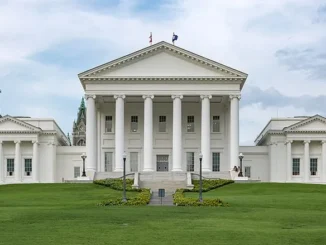
Talk about deadline pressure.
Virginia’s part-time legislators had just 60 days to grind through a groundbreaking but intricate 76-page Clean Economy Act in 2020 before voting yea or nay.
And that load hasn’t lightened. Energy-related bills continue to be plentiful and packed with head-scratching language as a former coal-centric state pivots toward embracing a renewable energy future.
Does absorbing confusing and complicated context have to be so burdensome?
No, says clean energy champion Sen. Scott Surovell, D-Mount Vernon, a legislator since 2010.
The Northern Virginia attorney introduced a bill this General Assembly session to reboot — and fully staff — the mostly dormant Commission on Electric Utility Regulation. Its 13 members — three citizens and 10 legislators — would be tasked with reviewing and explaining proposed energy policies to legislators and the public.
Sign up for Energy News Weekly
Get the most important energy news of the week delivered directly to your inbox.
“Our country and our state are currently undergoing a massive transition in how we produce electricity,” Surovell said in an interview about Senate Bill 1166. “To pull that off, we passed a lot of legislation in the last three years and so did the federal government.
“The commission needs to be available to robustly monitor the transition and ensure we’re doing it in the best way we can.”
It’s crucial, he emphasized, that senators and delegates not be solely reliant on industry lobbyists and environmental advocacy organizations for energy policy decisions.
“We’re often asked to consider extra-complex pieces of energy legislation that move around billions of ratepayer dollars,” Surovell said. “It’s important to make careful decisions.”
Having access to an expert policy staff, he said, would be a relief for legislators who have “difficulty sorting out what is right and wrong” during the hurly-burly of Virginia’s slam-bam 45- and 60-day sessions. This year’s shorter one is slated to end on Feb. 25 after kicking off on Jan. 11.
Virginia’s wider-reaching clean energy transition began somewhat modestly with the Grid Modernization and Security Act in 2018. It accelerated in 2020 with the Clean Economy Act, Solar Freedom laws, and the decision to join the Regional Greenhouse Gas Initiative, which addressed power sector emissions. Those were followed by Clean Cars, a 2021 initiative to curb carbon pollution from tailpipes.
Surovell has backed those major measures and also tried to fill gaps with laws such as one requiring Dominion Energy to offer community solar subscriptions. While rollout of his 2020 law has been stymied after regulators greenlighted a formidable $55 minimum fee charge by Dominion Energy, Surovell is trying to remedy that by tweaking his legislation this session. That measure, designed to lower minimum fees to about $20, passed the Senate on Feb. 3.
On Feb. 7, a revised version of Surovell’s attempt to reshape the Commission on Electric Utility Regulation, SB 1166, squeaked through the Democratic-majority Senate, 21-19. A companion bill introduced by House Majority Leader Terry Kilgore, R-Gate City, passed the GOP-majority lower chamber unanimously that same day.
Surovell’s bill is more contentious because it includes a measure budgeting $1 million to fully staff the commission. Kilgore’s version doesn’t.
That House-side funding deficit will have to be resolved, Senate bill supporters emphasize, for the commission to have teeth and clout.
Regulators not legislative arbiters
Virginia-based Harry Godfrey, managing director for Advanced Energy United, a clean energy policy advocacy group, cited two instances where a revitalized Commission on Electric Utility Regulation would have offered guidance for legislators and the public.
One, a commission analysis could have provided clarity on the numbers Dominion Energy laid out this session in a pair of ever-evolving bills targeting electric utility rate reform.
And two, commissioners could have provided a realistic evaluation of the long-term benefits of the Clean Economy Act when it was being crafted beginning in 2019.
The analysis provided by utility regulators, at lawmakers’ behest, fell short because while it hit the mark on rate impact, it whiffed on anticipating innovative technological advances in the clean energy sector, Godfrey said.
Staff with the State Corporation Commission presented dire cost predictions for ratepayers that didn’t come to pass, he said, noting that the review didn’t factor in basics such as the fuel savings from energy efficiency and solar power.
“The SCC shouldn’t be the legislative arbiters,” Godfrey said. “It was not designed to do that task.”
He envisions a fully staffed electric utility regulation commission as a “fusion center” where disparate pieces such as state energy laws, the governor’s quadrennial energy plan and utilities’ integrated resource plans can be synthesized into a comprehensive greener path forward.
In his eyes, a commission with the ability to track big-picture technology trends such as less expensive solar panels and battery storage could reshape public policy for the better.
“For instance, the Clean Economy Act calls for decarbonizing the grid by 2045,” Godfrey said. “Maybe we find out we can do that earlier. That’s my hope for what this can look like.”
Godfrey said the Surovell and Kilgore bills have heft because two “significant policymakers” introduced them.
“But it’s important to staff the commission,” Godfrey emphasized. “The real question is, are the dollars there to fund it?”
Advocates: Staffing is crucial
Environmental advocates favor Surovell’s vision for the bill.
“It sounds like the right direction to move the policy debate forward,” said Will Cleveland, a senior attorney with the Southern Environmental Law Center. “If it became what Sen. Surovell wants, it would be a good thing for Virginia.”
Peter Anderson, Virginia policy director for Appalachian Voices, said Surovell laid out the current problems with short-handed legislators succinctly when he first presented his bill at the committee level.
“This isn’t the U.S. Congress,” Anderson said with a laugh, adding that most state legislatures rely on part-time lawmakers with outside jobs and only bare-bones staff, if any at all.
Indeed, only 10 states have full-time legislatures, according to the National Conference of State Legislators. Generally, those members and staffers are well-paid, plus longer legislative sessions give them ample time to deliberate.
Also, Anderson noted that while lawmakers might be listening to industry and advocates to harvest details about floated energy bills, the utilities have a distinct advantage.
“Dominion Energy is the 800-pound gorilla in the room because utilities have the expertise and experts to explain” their side, he said, which dwarfs the advocacy community, “where each environmental organization has one lobbyist.”
A revamped commission, complete with a professional staff, is worth a try, Anderson said.
“I agree with Surovell that what we do now is a bit broken,” he said. “Being able to sit down and learn about energy proposals when it’s not the pace and pressure of the General Assembly session and make a considered decision, that in and of itself is a great thing.”
One caveat Anderson has is the bill’s directive to establish and fund what’s called the Commonwealth Energy Research Consortium.
In the original bill, that consortium was described as a network of statewide colleges and universities conducting energy and environmental research to analyze potential legislation, identify policies and programs to advance energy efficiency, save ratepayers money, and speed a clean energy transition in the public and private sectors.
While that “ivory tower” input is valuable, he said, recommendations would be more well-rounded by including the voices of environmental advocates and intervenors in rate cases.
Maximizing use of federal dollars
When the oversight commission was first created in 2008, it was made up of 10 legislators charged with monitoring how utility regulators executed laws affecting the state’s two largest power suppliers — Dominion and Appalachian Power. It has met infrequently since then, despite the constant stream of rate reform bills bandied about each session.
Surovell’s bill would add three citizen members with expertise in economic development, energy affordability and public utility regulation.
Hectic legislative sessions, Surovell said, limit public dialogue about energy policy and stifle third-party input.
“The energy transition is happening really fast and we need to have more conversations about it,” he said. “The public has been frustrated by the lack of transparency in how we make energy policy.”
Surovell emphasized that one of the commission’s top priorities is monitoring Virginia’s progress in separating from fossil fuels. Part of that translates to not missing out on maximizing the billions in federal dollars available from two Biden administration laws aiming to halt climate change by speeding up a clean energy revolution.
He and environmental advocates fear a commission alone would be a depository where bills are permanently delayed. That purgatory status would be prevented with full staffing and funding, they emphasize.
“It’s an opportunity for ideas and bills to mature and marinate,” Cleveland said. “But it only works if the commission becomes a vibrant participant … and not a place for bills to go and die.”



